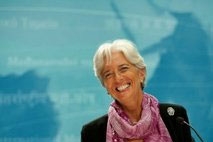Lagarde stresses fairness to all at IMF
 The former French finance minister also promised the International Monetary Fund would continue to weigh social issues like unemployment in its tough programs for fiscally shattered economies, and would be more open to dissenting policy views.
The former French finance minister also promised the International Monetary Fund would continue to weigh social issues like unemployment in its tough programs for fiscally shattered economies, and would be more open to dissenting policy views.
Lagarde, who replaces countryman Dominique Strauss-Kahn, expressed concerns about the "uneven" recovery from the 2008-09 financial crisis, about unsustainable sovereign debt in the eurozone and elsewhere, and the impact of "imported" inflation on poorer countries.
"Even-handedness, level playing field are words that you will hear me saying over and over," Lagarde said in a press conference on her second day as managing director.
"We should never lose sight of what we are about... to help restore stability where there is instability," she said.
The first woman to lead the Fund, Lagarde arrived Tuesday amid concerns that she would be too Europe-focused as the crises in Portugal and Greece continue to spin.
She rejected questions that she might carry a fixed ideological or geopolitical view of the problems she will have to deal with.
"No one should be earmarked with a particular label," she said. "I think you have to judge people by what they do."
But Lagarde said the eurozone crisis was an urgent matter, and that the IMF board would meet Friday on releasing a new tranche of the European Union-IMF 110 billion euro ($160 billion dollar) bailout to Athens.
She urged Greece's political parties to get behind the tough austerity program dictated on Athens as part of the rescue.
"I hope all the political parties can be rightly inspired by the examples made by political parties in Ireland, by the political parties in Portugal," she said in her debut press conference at the Fund.
"It comes at a time that political party rivalries should be set aside, when it's in the interest of the country," she said.
With the IMF under criticism that it has always, for 65 years, been headed by a European -- thanks to a pact with Washington -- Lagarde allowed the possibility that under her the Fund might create a third deputy managing director post for someone from one of the emerging economic powers.
In recent months there has been speculation of such a post and that it could go to someone from China, now the world's second largest economy.
"We have these tectonic plates that are moving at the moment, and that needs to be reflected in the composition of governance and employment at the Fund," she said.
The 55-year-old lawyer replaces Strauss-Kahn, who resigned on May 18 to fight allegations that he sexually assaulted a hotel chambermaid in New York.
Strauss-Kahn's arrest cast a cloud over the IMF, but since then prosecutors have admitted deep doubts about the accuser's credibility and New York newspapers reported this week that the case could soon be dropped.
Lagarde declined to comment specifically on the case, but said the media should "respect" the principle of presumption of innocence.
"I think the presumption of innocence is something that is highly valued the world over," she said.
She said she would keep up Strauss-Kahn's injection of social issues like job creation into the Fund's plans for helping countries restructure their finances.
"Clearly employment is a key issue ...that determines a stable social chemistry of a society," she said.
But Lagarde has to rebuild the Fund's image after Strauss-Kahn, who was respected for his policies but whose personal behavior raised questions about ethical standards.
The married Strauss-Kahn was censured by the board for an affair he had with an IMF economist, and media reports have since characterized such behavior as common at the Fund.
In May the IMF announced new ethics standards for inter-office relationships and for sexual harassment, and it has expanded ethics training for staff.
"I will be taking the training program on ethics," Lagarde said. "I look forward to it."
What the stars mean:
★ Poor ★ ★ Promising ★★★ Good ★★★★ Very good ★★★★★ Exceptional
Related Contents
Latest News
More News
- Russian President congratulates Vietnamese Party leader during phone talks (January 25, 2026 | 09:58)
- Worldwide congratulations underscore confidence in Vietnam’s 14th Party Congress (January 23, 2026 | 09:02)
- Political parties, organisations, int’l friends send congratulations to 14th National Party Congress (January 22, 2026 | 09:33)
- 14th National Party Congress: Japanese media highlight Vietnam’s growth targets (January 21, 2026 | 09:46)
- 14th National Party Congress: Driving force for Vietnam to continue renewal, innovation, breakthroughs (January 21, 2026 | 09:42)
- Vietnam remains spiritual support for progressive forces: Colombian party leader (January 21, 2026 | 08:00)
- Int'l media provides large coverage of 14th National Party Congress's first working day (January 20, 2026 | 09:09)
- Vietnamese firms win top honours at ASEAN Digital Awards (January 16, 2026 | 16:45)
- ASEAN Digital Ministers' Meeting opens in Hanoi (January 15, 2026 | 15:33)
- ASEAN economies move up the global chip value chain (December 09, 2025 | 13:32)

 Tag:
Tag:




















 Mobile Version
Mobile Version